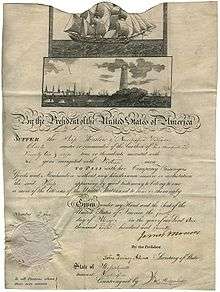Mediterranean pass
The Mediterranean pass (or Mediterranean passport, the name used in the United States) was a document which identified a ship as being protected under a treaty with states of the Barbary Coast. Such a treaty exacted tribute in exchange for protection from Barbary pirates capturing that country's ships and crews. These passes identified ships which had safe passage.
- For the Masonic passing order, see Knights Templar (Freemasonry).

The top of the British document was cut off in an erratic scalloped pattern used to confirm its authenticity. The matching top of the document was sent to officials along the Barbary Coast, so cruisers from those ports would have samples for comparison with the edge of the documents. A similar design was adopted by the United States, although U.S. Consul General in Algiers Richard O'Brien pointed out the document should be on thicker paper (or parchment) and kept in a tin container so as to ensure a better match between tops and bottoms (he also suggested that ships fly the American flag rather than the flags of individual states).[2]
Countries known to have issued such documents include:
- Algeria: Turkish passes were temporarily issued to some vessels by the Dey of Algiers.
- Britain[3][4]
- Spain
- United States of America[5]
The United States issued Mediterranean passports starting with a September 5, 1795, treaty with the Dey of Algiers,[6] and continuing through the mid-19th century.[7]
Background
For about 300 years, the Mediterranean Sea lanes were largely controlled by the north African Muslim states of the Barbary Coast (Tripoli, Algiers, Morocco, and Tunis) through piracy. Hostages were either ransomed or sold into slavery. Over time, most countries found it expedient to simply pay a yearly tribute (bribe) to the Barbary sultans in exchange for safe passage through the Mediterranean.
Following the American Revolution, the United States was no longer under the protection of the British tribute treaties, resulting in the crippling of American commerce in the Mediterranean. Having no significant navy, the U.S. decided to form tribute treaties with the Barbary states, such as the 1796 Treaty of Tripoli. This treaty required ship's passports within 18 months.
See also
| Wikisource has original text related to this article: |
References
- "Ship's passport for the vessel Mount Hope of Newport, Rhode Island" (PDF). NATIONAL ARCHIVES AND RECORDS ADMINISTRATION. August 2005. Retrieved 2007-01-19.
- "Burnt Island Road on board the Jamaica Packet". The Voyage to the West Indies. Archived from the original on 2006-12-07. Retrieved 2007-01-19.
- "Colonial America. Mediterranean Pass with British Stamp. NYSA_A3045_621". New York State Archives. Retrieved 2007-01-19.
- "THURSDAY, JULY 29, 1784". Journals of the Continental Congress, 1774-1789. Library of Congress. Retrieved 2007-01-19.
- "Mediterranean Passport". U.S. Naval Historical Center. Retrieved 2008-12-21.
- "Using the Seal as the Nation Expands" (PDF). U.S. Diplomacy Center. Archived from the original (PDF) on 2013-08-01. Retrieved 2008-12-21. Also, the National Archives has examples on file through at least 1840.